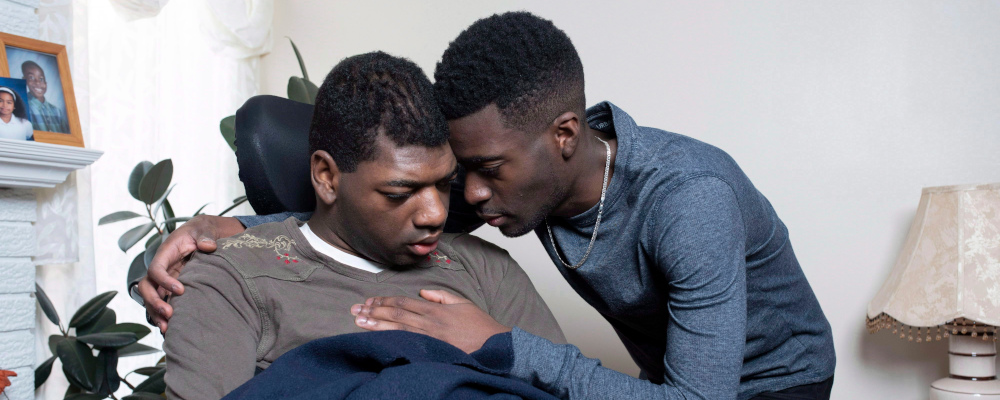When I was in high school my brother went through what we affectionately refer to as his “nudist phase”.
Every time he would go to the washroom, he would strip buck-naked and leave his clothes in the bathroom.
This made for some interesting conversations. He once scared off a pair of Jehovah’s Witnesses who got much more than they bargained for when they rang our doorbell.
At my 14th birthday party, I was in my living room with some friends, preparing to blow out the candles on a cake. From my vantage point behind the table, I could see the stairs that ran to our second floor. Suddenly, perched at the top of the stairs was my brother, in all his glory.
Mortified that my friends might see, I shot a panicked look to my best friend, who was well-familiar with my brother’s latest phase. I did my best to send a psychic plea for help.
To my relief, my friend got the message, glancing quickly to the top of the stairs.
Summoning all of my dramatic flair, I drew my other friends’ attention out the front window, pretending to see a wild animal. Everyone rushed to the window, while my best friend dove up the stairs and successfully redirected my giggling brother back into the bathroom to get dressed.
Crisis averted.
My brother wasn’t actually a nudist. While he does have a mischievous personality, his phase was largely driven by his being on the autism spectrum.
Like many individuals with autism, my brother has dealt his whole life with a severe developmental delay as well as many behavioural challenges. His stripping, for example, may have been the manifestation of a sensory tactile aversion to the fabrics, tightness of clothes, or a feeling of being confined. He is also completely non-verbal and suffers from epilepsy.
While his “nudist phase” is something that we laugh about today, it is emblematic of the experience of countless caregivers across the country. Whether you have a family member with a developmental disability, dementia, or a chronic illness, you have to be constantly ready to address your loved one’s needs. You are always on duty
With my brother, this includes helping him go to the washroom, getting him dressed, feeding him, making sure he takes his medications, and assisting him with recreational activities. Keeping him safe is always top of mind: in parking lots, the pool, shopping malls, and social outings. It is a 24/7 job.
It is estimated that over 8 million Canadians, like my parents and me, are caregivers today. That’s around one-quarter of the population. These caregivers spend a combined 5.7 billion hours supporting their loved ones. Their contribution to care is valued at approximately $97.1 billion. For context, that’s more than double what the federal government spends on health transfers to the provinces each year.
It’s not an exaggeration to say that without family members assisting with the care of their loved ones our health and social support systems would collapse.
Despite their vital role in the system, caregivers receive little to no support from our governments. Because of this, they often experience high levels of burnout, mental health challenges, and difficulties maintaining jobs.
A few years ago, a group of concerned citizens banded together and, with support from the Azrieli Foundation, launched the Canadian Centre for Caregiving Excellence (CCCE), our first umbrella organization to advocate for caregivers across Canada. This week, CCEC convened Canada’s first National Caregiving Summit in Ottawa, which brought together hundreds of advocates, researchers, caregivers, and government partners to kick-start a discussion about how we as a society can better support these vital contributors. I was proud to be a panelist and participant.
The goal is to develop a comprehensive National Caregiver Strategy, which would ensure that we have a coordinated approach nationwide for supporting caregivers. A plethora of problems could be addressed through such a strategy, including:
- How can we ensure that caregivers who balance responsibilities at home and work have the proper Human Resources supports and protections?
- How can we help caregivers better navigate the complex web of public supports available to their loved ones?
- How can we put in place stronger mental health supports for caregivers experiencing burnout?
- How do we better ensure a strong and stable health care and developmental sector workforce that can assist with respite and ease the burden?
- How can we better financially support caregivers who are giving up work in order to help care for a loved one?
All of these questions and others will have been addressed at this summit. And not only will we have had experts from around the country coming together to talk about this challenge, but we’ll also have had the benefit of many experts from abroad who flew in to share their experiences.

Some might ask: why is this necessary? Don’t family members have a moral obligation to care for their loved ones?
The answer is: of course they do. That’s why there are so many of us doing it every day.
But that doesn’t mean that they should have to do it without any support.
When boarding a plane, flight attendants always advise parents that, in the event of an emergency, they should put their own oxygen mask on before helping their children with theirs. This isn’t ageism. It’s because we need the parents to stay healthy so that they can continue to assist their children as needed.
The same principle applies here. As a society, we’re not providing an oxygen mask to our caregivers even though they dedicate countless hours to providing invaluable care to their loved ones. We risk losing some if we don’t.
Rosalynn Carter, America’s former First Lady, is quoted as saying: “There are only four kinds of people in the world—those that have been caregivers, those that are caregivers, those who will be caregivers, and those who will need caregivers.”
As you read this, you yourself may be taking care of an ageing family member or a loved one with a disability or chronic illness. You yourself might rely on someone as a caregiver. And even if you don’t fall into this category today, chances are you might at some point in your lifetime. Statistics suggest that half of us will be a caregiver during our lives.
So join our conversation! Check out the updates from the summit. And talk to your elected official about what they are doing to support caregivers. Together, we can make sure that caregivers get the supports we need so that we can continue doing what matters most: caring for those we love.
Recommended for You

Michael Kaumeyer: Polite decline: Canada’s aversion to being our best is holding us back

Howard Anglin: Lament for a Lament

‘A place where anybody, from anywhere, can do anything’: The Hub celebrates Canada Day

Peter Menzies: It’s no wonder Canadians are tuning out the legacy media



